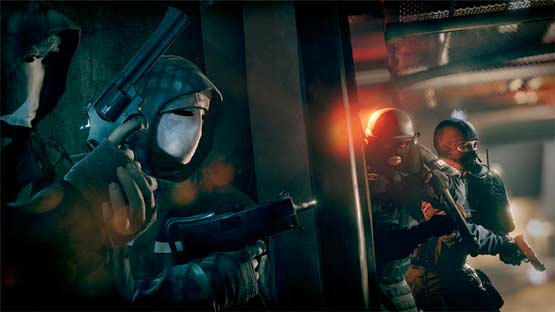
"Tom Clancy's Rainbow Six Siege"
Developed by: Ubisoft Montreal
Published by: Ubisoft
Available on: PlayStation 4, Xbox One, Windows
"The Socialist who finds his children playing with soldiers is usually upset, but he is never able to think of a substitute for the tin soldiers; tin pacifists somehow won't do." - George Orwell in his 1940 review of "Mein Kampf."
Tin soldiers aren't much in fashion anymore, but imagining war is still a fixation for people who make and play games. "Tom Clancy's Rainbow Six Siege" invokes war in the name of fun, a grim hallucination that turns the threat of terrorism into a pretext for sport.
In its first few hours, "Siege" feels incomplete, a small-bore game built around a multiplayer mode in which teams of five take turns attacking and defending a strategic target - sometimes a hostage, sometimes a bomb. After each round, players switch between acting as terrorists and special forces, competing in a cruelly conceived best-of-five contest that takes place against a backdrop of suburban bedrooms and cozy Christmas cafés. In place of a story mode, "Siege" offers 11 single-player "Situations," which play out on the same maps as the multiplayer and ask players to perform the same basic actions - rescuing a hostage, defusing a bomb, or killing all enemies - without the help of any teammates.
These feel hollow at first, like dramatized chess puzzles, but the absence of narrative context or characterization begins to feel purposeful, embodying the fantasy of the specialist who doesn't need to know why he's invading a fortified chalet in the French Alps, only that the order was given. The decision happens elsewhere, the debate about strategy and potential consequences out of his hands. For a game about guns and combat, "Siege" often makes one feel oddly vulnerable, powerless to do anything but follow orders and oversee the efficient discharge of one's weaponry.
"The ultimate goal of our enemy is still unknown," a male voice says in the brief cutscene that plays after you've fought the last of the Situations, set during a toxic gas attack on a college campus. As your character is sprayed down in a tent to cleanse himself of the toxic residue, your commanders confess that they still have no idea who they're fighting or for what purpose. The terrorists are untraceable, pale men in hooded jackets and white face masks who bear no national insignias, have no particular ideologies, nor seem to have any grievance with the people they've chosen to target.
Sport embodies this kind open-ended and depersonalized thinking in its own perverse way, a ceaseless pretext for conflict, in which the identity of participants matters less than their willingness to oppose one another., All encounters lead only to another game, with last round's terrorists getting to be the next round's specialists.
Each of the game's 11 maps alternate between oppressive and opulent- a biker gang bunker in a warehouse district here, a marble-floored Beverly Hills mansion there. But the rectilinear interiors quickly make each space feel interchangeable. They are spaces built to keep players in a maximum state of uncertainty about their opponents' movements with sight lines regularly interrupted by walls or barricades and where every room has one-too-many entryways to keep track of. The option to plant explosives on walls, which open new paths, ensures that every safe space feels like a sinking ship.
In 1986, shortly after his first novel had turned into best-seller, Tom Clancy delivered a commencement address to the students of Loyola University in Maryland. The child of a postal worker and department store clerk, his obsession with military fiction had come to him in a dream, a salvation from the dead end he felt he'd reached in his early 30s while working as an insurance salesman and supporting a wife and two children. "Nothing is as real as a dream," Clancy said. "The world can change around you, but your dream will not. Your life may change, but your dream doesn't have to."
Clancy has little specific connection to "Siege," but his fantasies of war as a way of liberating one's self from suburban servility are its animating force. As Orwell argued, the enduring appeal of fascist militancy preys on the fact that "human beings don't only want comfort, safety, short working-hours, hygiene, birth-control and, in general, common sense; they also, at least intermittently, want struggle and self-sacrifice, not to mention drums, flags, and loyalty parades."
Games like "Siege" flatter these desires by letting them play out in simulation, endlessly repeating on the screen. Stripped of the vanities of many other shooting games "Siege" is both unforgivably callow and inarguably satisfying. Like parades or fireworks, it's a vision that's only fun if you can forget where it comes from and where it points to.



 Contact The Editor
Contact The Editor
 Articles By This Author
Articles By This Author